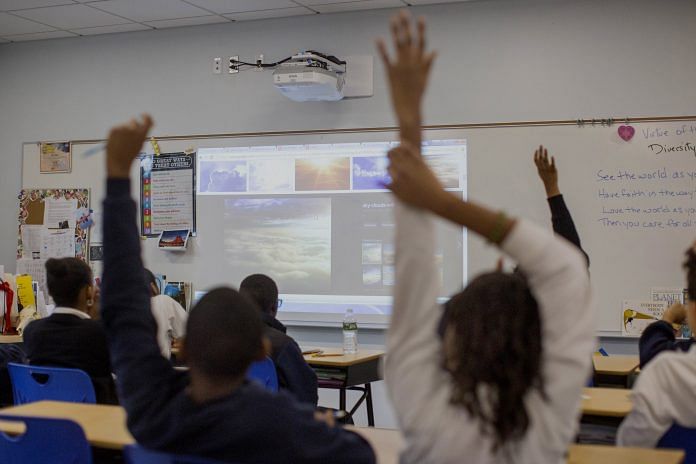Society’s growing focus on STEM has created a mindset that undervalues core humanities, a field that might help us become the best stewards of technology.
The potential automation of many jobs raises some big and tricky questions, but one of these hasn’t received sufficient attention: what is the true purpose of education at a time when machines are getting smarter and smarter?
I’ve spent my career working with some of the brightest engineers in technology and greatest humanitarians at the UN thinking about how we could bring the benefits of innovation to our customers and society worldwide. The latest and most powerful of these is the impending launch of the fifth generation (5G) wireless network, which can handle 1,000 times more data volume than the systems in place today.
As technology evolves, it’s become increasingly clear to me that our education systems are not preparing people for the opportunities that 5G and other Fourth Industrial Revolution breakthroughs will present. Educators, policy-makers, non-profits and the business community need to confront this fact – even if (especially if) this means questioning long-standing practices and trendy assumptions.
As more computers equal or surpass human cognitive capacities, I see three broad purposes for education:
- Most obviously, to instil the quality STEM skills needed to adequately meet the needs of our ever-more-technological society;
- Just as importantly, to instil the civic and ethical understanding that will allow human beings to wield these powerful technologies with wisdom, perspective and due regard for the well-being of others;
- To find much more creative and compelling ways to meet these first two needs across a far wider range of ages and life situations than has traditionally been the case in our education systems.
Quite understandably, the education-for-the-future discussion has focused on STEM (science, tech, engineering, math). Indeed, STEM education is a major priority for our own company; our Verizon Innovative Learning programme provides free connectivity, state-of-the-art equipment, a STEM curriculum and practical training to help low-income kids bridge the digital divide.
The logic for this is straightforward: as noted above, the value of these subjects in a tech-driven era is indisputable. If anything, our society must significantly improve its STEM education across all income levels and age groups and among both genders.
Yet there’s a case to be made that our society’s growing focus on STEM – while both laudable and necessary – has spawned an either/or mentality that undervalues the very subjects that might help us become the best stewards of technology. Those subjects include such core humanities as history, philosophy, literature and the arts.
The idea here is not to privilege some subjects over others; rather, it’s to yank us out of the increasingly pointless dichotomy between sciences and humanities. To master this new epoch, we need both – and we need to integrate them as never before.
What we really need, in short, are genetic engineers who have deeply absorbed Brave New World and historians who are capable of sophisticated data analysis. The sciences have ever more to give to the humanities and vice versa.
The case for such integration springs directly from the headlines. Time and again in the past few years, we’ve seen tech-savvy executives commit unforced errors as they interact with broader society on complex and sensitive issues like consumer privacy and the integrity of the political system.
The lesson is clear: for technology to deliver on its promise of human betterment, it needs a cultural and moral compass. For too long now, the disciplines that instil such a compass – the humanities – have been dismissed as an anachronism; whereas, on the contrary, they may be precisely what enables us to make the best use of increasingly potent technologies.
There’s something else we need from a Fourth-Industrial-Revolution education system: the full embrace of the concept of lifelong learning.
I realize I’m hardly the first to espouse the lifelong-learning ideal but we need to be more emphatic about making it a reality. Rather than a nice add-on to our current formal education system, it should be the concept around which the entire system is understood and organized.
The idea that our formal education should end at 22 or 25 (much less 18) is now completely outdated. As technology changes more rapidly – and as humans live longer lives, with more people working well past traditional retirement ages – the need for flexible, responsive schooling and training models is acute.
For example, we can and should stop reflexively associating “college years” with one’s late teens and early 20s. The universities of the future will increasingly see students in their 40s or 60s pursuing new degrees – and probably also a few precocious adolescents who have already demonstrated subject-matter mastery through online courses.
This is just a tiny sample of the changes that school systems – from primary to graduate-school level – will need to absorb in order to ensure that people are prepared for the Fourth Industrial Revolution.
As an eternal tech optimist, I strongly believe we can remain captains of our own destiny, even as technology becomes more powerful, if we educate our people to meet the challenge.
This was originally published on World Economic Forum.




